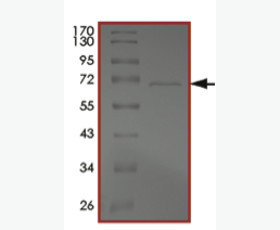Recombinant Human Syndecan-2/SDC2/CD362
| Product name: | Recombinant Human Syndecan-2/SDC2/CD362 |
| Source: | E.coli |
| Purity: | Greater than 95% as determined by reducing SDS-PAGE. |
| Buffer Formulation: | Lyophilized from a 0.2 μm filtered solution of 20mM Tris-Citrate, 150mM NaCl, pH 7.0. |
| Applications: | SDS-PAGE, Western Blot (WB), ELISA (EIA), Immunoprecipitation (IP) |
| Storage: | Avoid repeated freeze/thaw cycles. Store at 2-8 degree C for one month. Aliquot and store at -80 degree C for 12 months. |
| UOM: | 100ug/50ug/200ug/1mg/1g |
| Source | Human Cells |
| Description | Recombinant Human Syndecan-2 is produced by our Mammalian expression system and the target gene encoding Glu19-Glu144 is expressed with a 6His tag at the C-terminus. |
| Names | Syndecan-2, SYND2, Fibroglycan, Heparan Sulfate Proteoglycan Core Protein, HSPG, CD362, SDC2, HSPG1 |
| Accession # | P34741 |
| Formulation | Lyophilized from a 0.2 μm filtered solution of 20mM Tris-Citrate, 150mM NaCl, pH 7.0. |
| Shipping |
The product is shipped at ambient temperature. |
| Reconstitution |
Always centrifuge tubes before opening. Do not mix by vortex or pipetting. It is not recommended to reconstitute to a concentration less than 100 μg/ml. Dissolve the lyophilized protein in ddH2O. Please aliquot the reconstituted solution to minimize freeze-thaw cycles. |
| Storage |
Lyophilized protein should be stored at < -20°C, though stable at room temperature for 3 weeks. Reconstituted protein solution can be stored at 4-7°C for 2-7 days. Aliquots of reconstituted samples are stable at < -20°C for 3 months. |
| Purity |
Greater than 95% as determined by reducing SDS-PAGE. |
| Endotoxin | Less than 0.1 ng/µg (1 IEU/µg) as determined by LAL test. |
| Amino Acid Sequence |
ESRAELTSDKDMYLDNSSIEEASGVYPIDDDDYASASGSGADEDVESPELTTTRPLPKILLTSAA PKVETTTLNIQNKIPAQTKSPEETDKEKVHLSDSERKMDPAEEDTNVYTEKHSDSLFKRTEVDHH HHHH
|
| Background | Syndecan-2 is a member of the Syndecans family comprised of type I transmembrane heparan sulfate proteoglycans (HSPG) that are involved in the regulation of many cellular processes. Four sub-types of mammalian Syndecans have been reported and among them. Syndecan-2 plays a role in the cancer development. It can affect the basal and chemotherapy-induced apoptosis in osteosarcoma. It can also suppress MMP2 activation, suppressing metastasis. |














